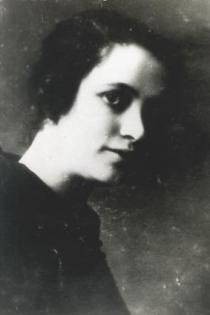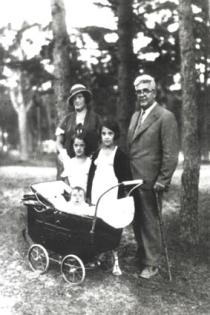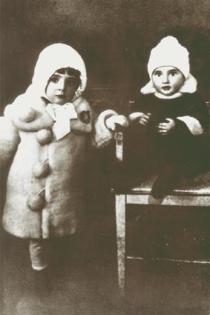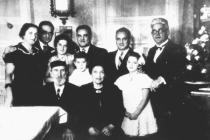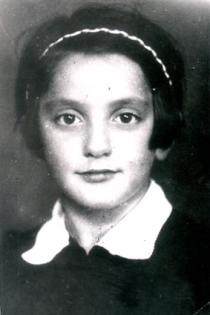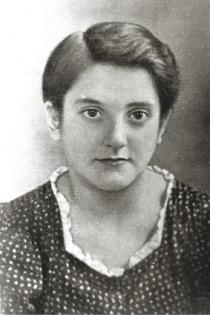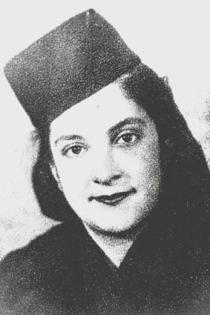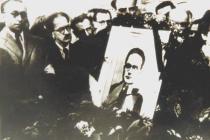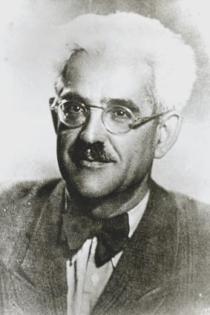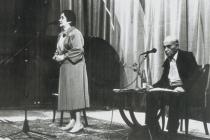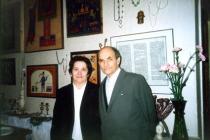This photo was taken in Vilnius in 1946. Here I’ll tell you about my life after the end of the war.
When I returned to Vilnius from the concentration camp (in 1945), I saw the city in ruins. I had no problems with my neighbors. At my work (I was an editor at the Vilnius Municipal Arts Department) my chief Banaytis was a very decent person and he paid attention to my emotional experience regarding my nationality. He said 'Don't worry, here we pay no attention to nationalities.' I didn't come across any manifestations of anti-Semitism. Among my colleagues there was a chief accountant - a Jew, a chief manager - also a Jew. My next job I got at the State Vilnius Philharmonic Society: there were many Jews, Poles, Lithuanians. Their hatred against Russians forced them to be nice to local Jews.
When I returned to Vilnius after all ordeals of the war time, I met Daddy in the street by chance. He already knew that Miriam remained alive. After the war she became a student of the Faculty of Law at the Vilnius University.
Now she lives in Klaypeda. Her husband tragically died: he drowned when she was 39 years old. She has got 2 sons and 5 granddaughters. And she still works (notwithstanding her age). Together with her children my sister visits our town Plunge every year on July 18 (the day of execution of Jews in Plunge).
Unfortunately after the end of the war Daddy lost hope that his wife and children Raya and Ruvel remained alive. All that hastened his death. I guess he was unhappy. Half a year before his death he left his work, because a doctor said 'If you go on working you will fall down dead!'
After the end of the war we spent a lot of time in Palanga together with Daddy. He often recollected the past. Once he reminded that when we were children, he got ill, but nevertheless (having running temperature) went to his office to work, because he wanted to show us the necessity of struggle, the necessity of work. I said that at that time we understood nothing. Daddy also often explained to us that it was very important for a person to become educated. Again, at that time I could not understand him. When Hitler came to power, I thought it was only important to have a rifle in your hands.
When I returned to Vilnius from the concentration camp (in 1945), I saw the city in ruins. I had no problems with my neighbors. At my work (I was an editor at the Vilnius Municipal Arts Department) my chief Banaytis was a very decent person and he paid attention to my emotional experience regarding my nationality. He said 'Don't worry, here we pay no attention to nationalities.' I didn't come across any manifestations of anti-Semitism. Among my colleagues there was a chief accountant - a Jew, a chief manager - also a Jew. My next job I got at the State Vilnius Philharmonic Society: there were many Jews, Poles, Lithuanians. Their hatred against Russians forced them to be nice to local Jews.
When I returned to Vilnius after all ordeals of the war time, I met Daddy in the street by chance. He already knew that Miriam remained alive. After the war she became a student of the Faculty of Law at the Vilnius University.
Now she lives in Klaypeda. Her husband tragically died: he drowned when she was 39 years old. She has got 2 sons and 5 granddaughters. And she still works (notwithstanding her age). Together with her children my sister visits our town Plunge every year on July 18 (the day of execution of Jews in Plunge).
Unfortunately after the end of the war Daddy lost hope that his wife and children Raya and Ruvel remained alive. All that hastened his death. I guess he was unhappy. Half a year before his death he left his work, because a doctor said 'If you go on working you will fall down dead!'
After the end of the war we spent a lot of time in Palanga together with Daddy. He often recollected the past. Once he reminded that when we were children, he got ill, but nevertheless (having running temperature) went to his office to work, because he wanted to show us the necessity of struggle, the necessity of work. I said that at that time we understood nothing. Daddy also often explained to us that it was very important for a person to become educated. Again, at that time I could not understand him. When Hitler came to power, I thought it was only important to have a rifle in your hands.

